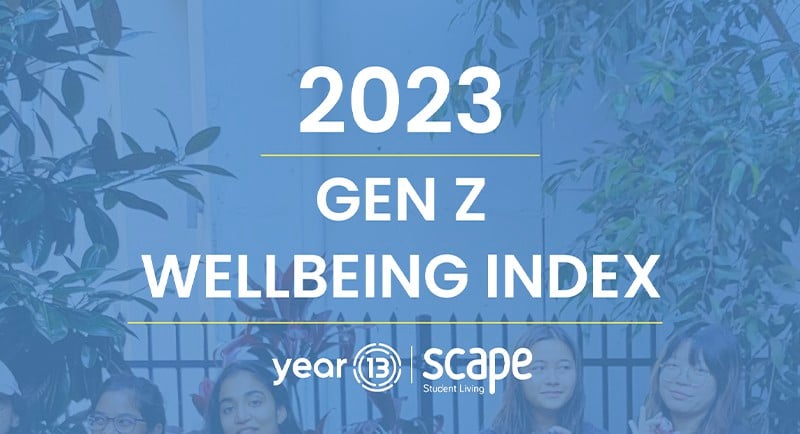Gen Z is suffering from anxiety and lack of sleep, while struggling to make and keep friendships, according to a national youth wellbeing study by Australian digital youth engagement platform, Year13, in partnership with student accommodation provider, Scape.
In the partnership’s first 2023 Gen Z Wellbeing Index, approximately two thirds of young Australians were recorded as saying they have problems getting a good night’s sleep (66 per cent) and suffer from anxiety (61 per cent), while those struggling to make friends (41 per cent) and suffering from loneliness (37 per cent) were potentially noting an overall impact on their wellbeing, with 37 per cent considering their mental health to be only fair or poor.

Undertaken in May 2023, with the results released in August 2023, the survey explored the mental health, exercise, sleep and diet patterns of more than 1,000 young Australians and 900 Scape residents aged between 18 and 24 years.
In analysing the survey responses, Year13 and Scape found that of the key wellbeing indicators:
• Two thirds of young Australians say they have problems getting a good night’s sleep (66%) and are suffering from anxiety (61%);
• Half (51%) of young Australians say the rising cost of living is negatively impacting their wellbeing;
• Almost half of young Australians say they are suffering from low self esteem (46%); wake up feeling tired and lethargic (45%); and are suffering from poor body image (44%);
• More than one third (41%) of young Australians say they struggle to make friends and in turn, suffer from loneliness (37%) and consider their mental health to be only fair or poor (41%);
• Just one third of young Australians say they have a purpose (35%); are physically active enough (37%); eat enough healthy food (37%); and spend enough time outdoors (32%).
Year13 co-founder, Saxon Phipps, said that many of the prevalent findings in the data were previously considered non-issues for many young people.
“Loneliness and making friends are now real issues for this age group. Coupled with the cost of living and burnout, it is becoming clear that wellbeing intervention is urgently needed to help young people navigate their life transition from school to adulthood and independence,” Phipps said.
“For many, our wellness habits and our wellbeing are intimately linked. Supporting young people’s wellbeing is vital to driving improved outcomes across all aspects of their lives, including their education, and into their future.”
Underpinning the benefits of purpose-built student accommodation (PBSA), the study results were more positive for young people living in Scape buildings, suggesting that moving out of home could be pivotal in improving overall wellbeing, particularly when moving into dedicated student accommodation.
Scape Australia’s Chief Executive Officer, Anouk Darling, said that 71 per cent of students living in Scape PBSA noted that friendships and making new friends came easily to them, as compared to the 41 per cent of average Australian students who struggled to make friends. Scape residents also reported less chance (30 per cent) of suffering from loneliness than the average Australian student.
Darling went on to say that based on the research, Scape residents were more likely than their counterparts to be in better physical and mental health, be able to sleep better, have a healthier diet and cook for themselves.
“We know that wellbeing support is imperative for this generation so wellbeing is a major focus of our student accommodation programs. The Scape accommodation offering is strongly guided by students who have input into everything we do, from neighbourhood events and networking opportunities to adulting courses and safety and security applications,” Darling said.
“One of the big differences for students living in purpose-built accommodation is that they gain satisfaction through independence and, importantly, that it’s easier to make friends – and what we’re seeing in the data is that this is having a positive flow-on effect and improving overall wellbeing.”
Scape Australia co-founder and Group Executive Chairman, Craig Carracher AM, said that PBSA was often the first time a young person experienced living away from home so “supporting Scape residents to learn to be independent through this transition is a priority”.
“Our students are cooking meals with others in the kitchen, they’re making friends – and that goes a long way to helping them adjust to the early days of life away from home. One of the key factors we invest in is social interaction, so we are pleased to see the survey data shows that Scape residents are significantly less likely to suffer from loneliness and are in better mental health than students not living in PBSA,” Carracher said.
The 2023 Gen Z Wellbeing Index also revealed that young people were not immune to the cost-of-living crisis, with 51 per cent of young Australians saying the rising cost of living was negatively impacting their wellbeing. Further to this, 78 per cent of young Australians said the cost-of-living issue concerned them, making it their top issue of concern, followed by housing/rental affordability (67 per cent), climate change (60 per cent) and mental health (57 per cent).
“Young people have enough to stress about without also having to deal with the high cost of living while they get on their feet,” Year13’s Stubley said.
See Also: Year13: New kids on the digital media block cutting through to Gen Z
